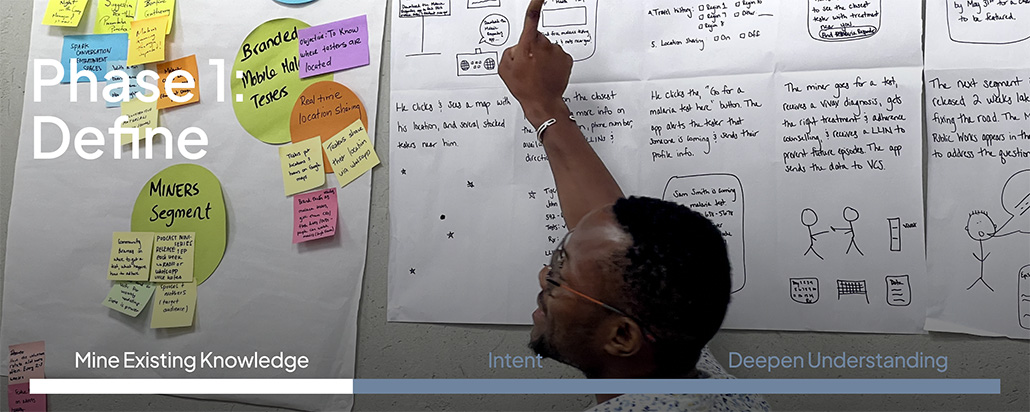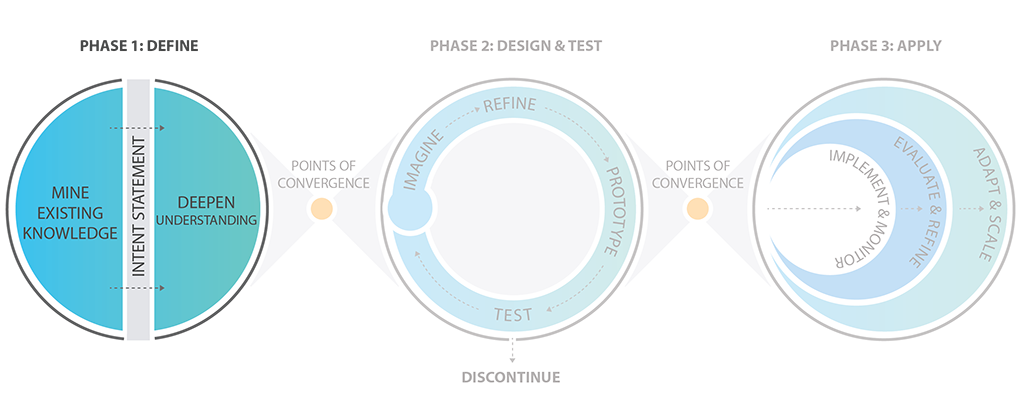Mine Existing Knowledge

Guyana, Define
Les Define Phase establishes the foundational understanding of the challenge from two perspectives: (1) existing knowledge and published literature, and (2) new, shared knowledge of lived experiences in households, communities, health systems, and political environments. It provides the opportunity to immerse oneself into the world in which people live and to design better solutions. This phase also provides an opportunity for key stakeholders to align with shared intent for the activity or project objective, building relationships and buy-in from the outset.

Mine Existing Knowledge
How can we find and use what is already known?
By the end of this step, your team will understand the existing data and be able to concisely summarize what members of the field already know through a literature review and/or situation analysis.
How to conduct this step and achieve its main objectives:
Develop a Research Plan
A good research plan becomes your roadmap for advancing through the Define Phase. It allows you to set clear research objectives, enabling the systematic conversion of chaotic data into relevant categories and the specific information you require. In essence, it’s your tool for achieving focus, ensuring you’re on the right path to uncover the information you need.
Lines of Inquiry Canvas
Suggested time:
5–6 hours
Participants:
Design and research team
Tool: Lines of Inquiry Canvas
Lines of inquiry represent the essential questions and prompts that steer your research when engaging with stakeholders. This template is designed to assist you in precisely defining these inquiries. Typically, these lines of inquiry are structured around overarching research themes, such as understanding audience motivations, values, beliefs, or delving into both structural and non-structural barriers. They serve as a fundamental compass, directing your efforts and priorities throughout the research process.
Effort required:

Review Existing Knowledge
A literature review is a powerful tool to thoroughly examine existing literature and data. When done well, it allows you to identify common themes, patterns, and compelling areas for exploration. Leverage the literature review to guide your and inform the Define Phase, pinpointing research gaps and areas demanding further inquiry.
Literature Review Template
Suggested time:
Multiple days, depending on size and scope
Participants:
Design and research team
Tool: Literature Review Template
Conducting a comprehensive literature review can be a daunting task, especially considering the extensive array of resources at your disposal. This template serves as a valuable tool to assist you in structuring and managing the information. As you initiate the process of delving into existing knowledge, it helps keep a systematic record of data and information, making the task of reviewing literature more manageable and organized.
Effort required:

Research Synthesis Template
Suggested time:
Multiple days, depending on size and scope
Participants:
Design and research team
Tool: Research Synthesis Template
Once you’ve gathered the pertinent information, this tool facilitates the process of synthesizing it. The guide leads you through a structured synthesis process, assisting you to distill the most relevant knowledge. It achieves this by helping you harvest and cluster relevant data, identify key themes, and extract critical insights from the gathered information.
Effort required:

